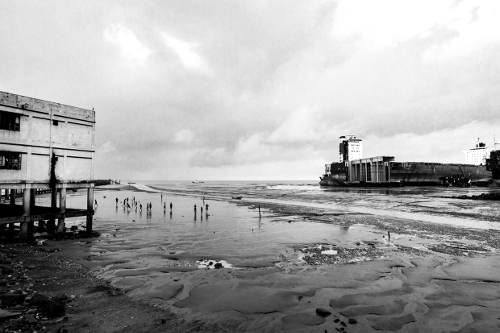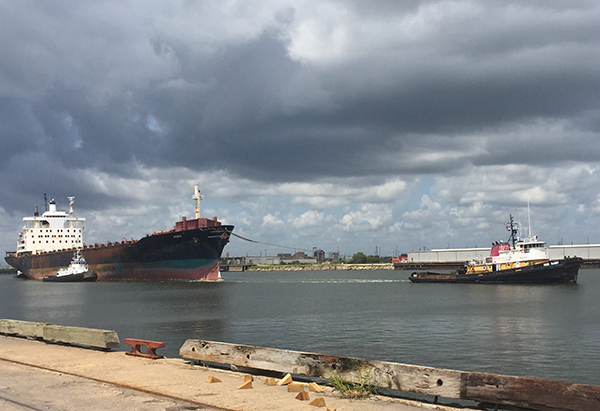Standard Chartered Bank, Belgian ship owner CMB / Bocimar as well as the Greek Kanellakis Group are linked to Kabir Steel, a Bangladeshi shipbreaking yard and re-rolling mill with a particularly bad accident record where private security guards shot at locals protesting the death of worker Sumon on 28 March [1]. The leading Flemish daily newspaper De Standaard has analysed CMB’s substandard shipbreaking practices in a two page article published last Friday showing how the Antwerp-based shipping company uses cash buyers to rid itself of financial and legal risks. The Platform calls on these European companies to ensure that their value chain neither contributes to such negative human rights impacts nor to hazardous waste dumping and pollution in Bangladesh.
Whilst NGOs and international trade unions have called upon the police to impartially investigate the circumstances of the recent shooting episode at Kabir Steel, it is no secret that the Chittagong-based firm, which runs shipbreaking yards at two different plots as well as a local steel re-rolling mill, has a particularly bad accident record. In January 2014, three workers suffered severe burn injuries in an explosion on a tanker beached at the yard. Only after Platform members took up their case did the men receive treatment and support. The case received both local and international media attention, and the CEO of the Norwegian ship owner Teekay Corporation, whose vessel was involved in the incident, publicly stated that the company will stop selling ships to substandard yards. Early in 2014, two more workers, Jafar and Lipton, were injured and taken to hospital. In August 2014, worker Afzal died in the hospital after an accident at Kabir, and a second, unidentified man suffered injuries. In September 2014, 20 year old Asad Mia was killed at Kabir’s re-rolling mill to which the scrap steel is taken.
The London-headquartered Standard Chartered bank has, according to local informants, been issuing letters of credit or loans to Kabir Steel for the import of end-of-life vessels. The Platform has sent a letter to Standard Chartered’s management asking why the bank is working with a yard that clearly operates in breach of Standard Chartered’s own ship recycling policy: according to this policy the bank will only work with yards that meet international workers’ rights and environmental protection standards.

Leading banks, amongst them ABN AMRO, are cooperating with companies to invest in sustainable ship recycling in industrial platforms.
Also major European shipping companies are linked to the dangerous and dirty shipbreaking practices at Kabir Steel. The end-of life vessels currently being scrapped on the beach of Kabir Steel shipbreaking are the ALPHA FRIENDSHIP and the MINERAL WATER. The ALPHA FRIENDSHIP’s was sold to Kabir Steel for scrapping by Greek Kanellakis Group with the help of cash buyer Wirana. The ship owner is part of a group of shipping companies controlled by the influential Kanellakis and Angelicoussis family. The vessel arrived in Bangladesh this January while still registered under the Greek flag.

The MINERAL WATER was sold to Kabir Steel by Belgian ship owner CMB N.V. S.A. and its wholly-owned Belgian subsidiary Bocimar International with the help of cash buyer Western Overseas. CMB is an Antwerp-based company specialised in bulk carriers. It is controlled by the well-known Saverys family who also holds major stakes in other leading Belgian ship-owning companies, Exmar, Euronav and Delphis. The MINERAL WATER swapped its Belgian flag to that of Niue just weeks before hitting the beach in Chittagong mid-February. Niue, a Pacific island with around 2000 inhabitants, is on the European Union’s blacklist of the world’s 30 worst-offending tax havens and has recently come up as a new low-cost flag of convenience for end-of-life vessels.

The Platform is calling upon the European Union, where more than 40% of the world fleet is controlled, to ensure that ship owners cannot further exploit underpaid workers exposed to extremely dangerous working conditions and the absence of properly enforced environmental protection standards.
NOTES
[1] As reported by the NGO Shipbreaking Platform , private security guards employed by Kabir Steel shipbreaking, injured at least seven workers and locals when they gathered at the yard’s gate in protest of the death of Summon. The young man had been killed when he was hit by a truck transporting material from the shipbreaking yard. The yard management had first refused responsibility for the accident as the truck was owned by another company. The Platform and its local member organisations as well as Bangladeshi and international trade unions have strongly criticized the use of violence against protestors. They have both called on Kabir Steel to pay compensation owed to the victim’s family, and on the police and judiciary to properly and independently investigate the case to bring those responsible to justice. Meanwhile, Kabir has paid compensation to the victim’s family and those injured by bullets.
[2] For more information on the conditions at the shipbreaking yards in Chittagong, see short video by National Geographic.

One of the victims, worker Afzal, who died at Kabir Steel mill in 2014








